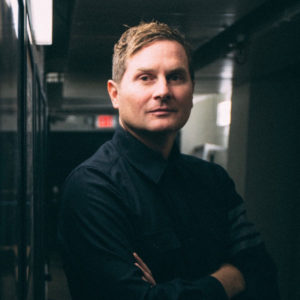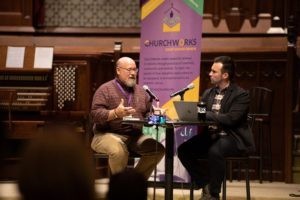It seems just about everyone is listening to podcasts these days, and on just about every subject imaginable – from sports and history to finance, politics and, yes, religion.
In fact, faith-based podcasters say the format is tailor-made for all things spiritual – including fostering the kind of fellowship and discipleship some considered the sole domain of churches.
“Podcasting creates this intimate relationship between podcasters and listeners that you can take action on,” said Tripp Fuller, the Baptist minister and beer lover whose “Homebrewed Christianity” podcast draws tens of thousands of listeners with every episode.

Tripp Fuller
Podcasts are downloadable, digital audio files consumed at listeners’ convenience. Most come with zero or few ads which, even then, can be skipped.
Formats include re-broadcasts of radio and television talk shows, academic lectures, TED Talks, post-game call-in shows and stock market analysis.
Religious podcasts include scripture reading, Bible studies, sermons, devotionals and interviews with well-known theologians.
As a whole, podcasts are attracting more and more Americans, according to a CBS News poll published in January.
“Most Americans now listen to podcasts, and the percentage who do has risen considerably over just the past year,” the network reported. It found that two-thirds of Americans listen to podcasts “at least once in a while” and that 23 percent do so multiple times a week.
“By comparison, a year ago, a majority of Americans said they never listened to podcasts.”
The increase covers all age groups, including the 20 percent of Americans 65 and older who said they listen to podcasts “Daily/few times a week,” CBS News reported.
‘You can have real intimacy’
The proliferation of religious-issue casts is at the very least keeping apace with other subject areas, including sports and health. A cursory Google or app-store search shows that.
But the breadth of faith-based offerings is remarkable. They come in every religious, denominational and theological expression imaginable.
Within Christianity, they range from the daily pep talks of televangelist Joyce Meyer to the theological pronouncements of Southern Baptist leader Albert Mohler.
Progressive Christians are breaking ground in podcasting, offering scattered adherents’ access to personalities and ideas they cannot find in their own churches and communities.
There’s even evidence that a lot of the people who have given up on church – but not necessarily on faith – are getting the spiritual inspiration they seek from podcasts, said Fuller. Yet others are finding healing from the toxic faith they experienced growing up.
He cited an immensely popular podcast titled “The Liturgists,” which describes itself as “a global community” subverting barriers around faith, race, gender and sexuality in an effort to heal “the spiritually estranged.”
Such podcasts function as fellowship for those who disconnected from religious institutions, Fuller said.

(Photo/sridgwa/Creative Commons)
“Their online community is really a substitute for people hurt and burnt by evangelicalism.”
“Homebrewed Christianity” shares that role for some, Fuller said. Online, it’s described as a theology podcast “for nerds who have doubts, like questions, and desire a more beautiful (and zesty) world.” Its “community” section even offers titles for followers, including acolyte, deacon, elder and bishop.
Individual episodes draw 20,000 to 30,000 listeners within the first 48 hours after posting, and more than 70,000 over the following month. The podcast will be downloaded more than 3 million times in a year’s time, he said.
Listeners include ministers and lay people who dare not ask probing theological questions in their own congregations. There are atheists and ultra-conservative Christians, who like to complain about the content. It’s also popular among theologians, religion scholars, various thought leaders and other academics.
People from just about every denomination download the episodes, he said.
“We even have a whole group of angry Orthodox (Christians)” who listen regularly.
Fuller said listeners listen to the podcast while driving, jogging, doing chores and other activities. That flexibility is one of the strengths of the format.
“You can have a real intimacy when you listen regularly. You really feel like you are part of something.”
‘It does something for me, too’
The intimacy inherent in podcasts is revolutionary in an age when churches and denominations are waning, said Rob Bell, the founder and former pastor of Mars Hill Bible Church and bestselling author and speaker who produces “The RobCast,” a weekly podcast.

Rob Bell (RobBell.com)
“A number of institutions, culture-wise, have outgrown their usefulness,” Bell said. “There’s something about the global freedom of this particular medium that is needed right now.”
Podcasting offers an opportunity for religious education and spiritual development that is unfettered by the parameters of religious institutions.
“This can take you wherever it leads,” he said. “That’s doing something really powerful. Conversations are being heard now that have never been heard before.”
The closeness Bell feels with his audience is deepened because he often diverts from his intended topic to all manner of “interruptions and riffs and tangents.”
Bell said he hears from many listeners who say this gives “The RobCast” an intimate and conversational feel.
“And it does something for me, too,” he said.
Navigating a post-Christian world
Podcasts can have intensely practical purposes, too.

Andy Hale interviews Sam Harrell at CBF’s 2019 ChurchWorks conference in St. Louis. (Photo/CBF)
That was the point of the Cooperative Baptist Fellowship’s “CBF Podcast,” hosted by Andy Hale, the pastor of University Baptist Church in Baton Rouge, Louisiana.
The initial concept several years ago was to offer resources and inspiration to church starters. Hale led CBF’s new church starts initiative at the time.
It has since morphed to include topics requested by churches as well as interviews with authors, theologians and ministers. Hale hosted live recordings of the podcasts with a variety of guests during the Fellowship’s recent General Assembly in Birmingham.
“The concept now is to bring CBF churches and ministers conversations and resources that we feel will enhance their ministries,” Hale said.
Those personalities represent a broad range of American faith, such as Brian McLaren, Shane Claiborne and the late Rachel Held Evans. Hale also has hosted journalists who write on religion.
“It’s more or less helping people to understand how churches might navigate this post-Christian world we live in,” Hale said.
